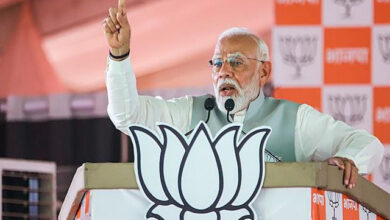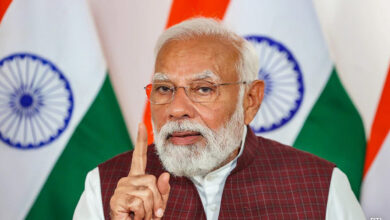Surgical strike on corruption, terrorism and FICN

15th Nov, 2016: Prime Minister Narendra Modi has done another surgical strike on November 8 when he announced that currency notes of Rs.1000 and 500 would not be a legal tender from midnight. The demonetisation of the high value currency notes would be a gargantuan assault on corruption, terrorism, fake currency and hawala transactions. Mr Modi elaborated that these high denomination notes can be exchanged in banks as well as in Post Offices up to December 30, with some restrictions. The second surgical strike was welcomed by masses and fully supported by experts as the black money puts an unnecessary burden on the honest tax payers.
Mr Modi rightly mentioned that corruption and black money are deeply entrenched in the system and demonetisation of these notes is a big step to curb the menace. The Global Financial Integrity report revealed that $94.8 billion was siphoned off from India in 2012. Again Swiss National Bank reported that Indians deposited Rs.14,000 crore in Swiss banks in 2013. According to the Swiss Bankers Association, Indians stashed about $2 billion in all Swiss banks. There are about 70 places in the world where black money can be deposited. Hence one can imagine the quantum of black money abroad. But it is also a fact that bringing back black money from abroad is a nightmare.
Black money within country is much more than it was deposited abroad. The analysts claim that currency of about Rs.3,35,000 crore would be destroyed because of demonetisation of currency notes of Rs.500 and Rs. 1000. Hence government should first handle black money within country and then efforts should be made to bring back the black money which has left the shores

Large amount of black money is utilised in real estate which has hiked the price of houses so much that it has gone beyond the reach of lower or even middle class. The experts point out that if use of black money is stopped in real estate the prices of houses would come down and more people would be able to purchase the houses. Real estate is a major source of generation of employment and if it functions well it will strengthen the economy.
There is a nexus between politicians and business houses and black money is extensively used by political parties. According to National Election Watch and Association of Democratic Reforms, 75 per cent donations to all the political parties are through undeclared sources. In most of the democracies like United States, Japan, Nepal, Germany etc. the donations to the political parties are in public domain but unfortunately in India there is no transparency, hence black money plays a vital role in the elections. The present demonetisation may cleanse forthcoming assembly elections also.
The surgical strike of November 8 would also decrease the hazard of counterfeit currency. India is a cash-based society and Fake Indian Currency Notes (FICN) became a big hazard for the economy of the country, the new currency notes have more security features and would be difficult even for Inter Services Intelligence (ISI)-superintended Pakistani presses to emulate.
According to a reliable assessment India had Rs.169,000 crore FICN in 2000 and at present it might have reached to 1,200,000 crore.
The intelligence agencies claim that the ISI which has waged a low intensity war, pumps crores of counterfeit notes of Rs.1,000 and 500 denominations in India.
According to a recent study Rs.1,000 notes constitute about 60 per cent of FICN in circulation in the country.
The Directorate of Revenue Intelligence (DRI) which is the lead agency to curb smuggling claims that FICN are printed with precision in Pakistan government controlled presses with maximum security precautions. The quality of the FICN is so good that it is difficult to distinguish between the real and counterfeit notes. Pakistan is involved in printing of FICN is evident by the fact that it imports much more paper and ink then required for printing its own currency. The powerful ISI prints FICN in government controlled printing presses in Multan, Quetta, Lahore, Karachi and Peshawar and then pumps it in India through numerous countries including Nepal, Bangladesh, Gulf Countries, Sri Lanka, Malaysia, Thailand, China and Myanmar. ISI also smuggles FICN through Indo-Pak borders.
The intelligence officers claim that ISI spends about Rs.39 in printing of one Rs.1,000 note and sells it to smugglers for about Rs.400, it pumps FICN worth Rs.1,700 Crore hence it earns a net profit of about Rs.600 Crore annually, which it utilises in intensifying terrorist activities in India especially in Jammu & Kashmir (J&K).


ISI funds various terrorist outfits including Indian Mujahideen (IM), Lashker-e- Taiba (L-e-T), Jaish-e-Mohammed (J-e-M), al Badr and separatist leaders of J&K. The nefarious ISI also assists various terrorist organisations of Left Wing Extremism (LWE).
Dawood Ibrahim who is a protégé of ISI and has a big network of agents and sub agents in India also plays a vital role in smuggling of circulation of FICN in the country. Aftab Batki who is the foremost man behind FICN smuggling to India was previously based in Dubai now shifted to Karachi.
Indian security officials arrested several smugglers with FICN and they also confirmed the involvement of ISI officers in the smuggling. A prominent L-e-T operator Abdul Karim Tunda during interrogation also confirmed ISI entanglement in smuggling of FICN.
The MOU signed with Bangladesh in 2015 immensely helped in curbing the smuggling of FICN through Bangladesh. The present Sheikh Hasina government smashed ISI network within country. The present Nepal government has also taken stringent actions against smuggling of FICN through Nepal. In past one First Secretary of Pakistani mission in Nepal was sent back because of his participation in smuggling of FICN.
ISI uses Pakistan International Airlines (PIA) as well as diplomatic bags in smuggling of FICN to diverse countries. In Pakistani diplomatic missions ISI officers distribute FICN to their various couriers and sub couriers who smuggle it to India.
The Hawala operators also use large denominations notes especially of Rs.500 and Rs. 1,000 and the demonetisation of these notes would adversely affect their illegal transactions.
Demonetisation of Rs.1,000 and 500 notes is also a big blow to multiple terrorist outfits. According to reports few leaders of LWE organisations have already threatened the contractors and businessmen of the areas to convert their defunct currency which is in several Crore. A businessman was already caught when he was converting Rs.25 lakh of a leader of Peoples Liberation Front.
The defunct notes have to be deposited in the bank hence more and more persons would open bank accounts. It will also prove to be a major step towards a cashless society.


The decision of demonetisation of bigger denomination notes is an admirable decision but it appears that full preparation was not made. There are long queues in front of Banks. Most of the ATMs are not functioning and as usual bank employees are not fully cooperative. Government should have taken adequate measures so that there are no hassles in deposits and withdrawals from the banks, which is necessary to keep the confidence of public intact in the banking system of the country.
Government should also make the tax system easy and transparent. It must take sufficient measures so that black money is not generated and the corrupt persons are punished quickly.





